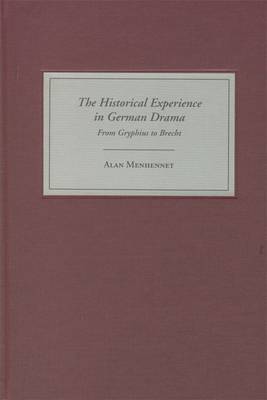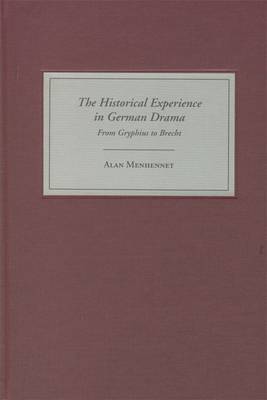
- Afhalen na 1 uur in een winkel met voorraad
- Gratis thuislevering in België vanaf € 30
- Ruim aanbod met 7 miljoen producten
- Afhalen na 1 uur in een winkel met voorraad
- Gratis thuislevering in België vanaf € 30
- Ruim aanbod met 7 miljoen producten
Zoeken
€ 115,45
+ 230 punten
Omschrijving
A survey of 17th- to 20th-century German dramatic works that not only treat historical events but yield a historical experience. In what is still the standard survey of German historical drama, Das deutsche Geschichtsdrama (1952), Friedrich Sengle understands "historical drama" as that in which objective history is blended with an idea that isthe basis of its dramatic coherence and force. This idea inevitably becomes the engine of a dramatic action, inclining the theatergoer to become wholly engaged with dramatic characters in a dramatic present, rather than with "real" figures in a historical past. Such plays (for instance Schiller's Maria Stuart) may remain broadly "true to history," but the experience they afford is often not historical; that is, it may be emotionally and intellectually compelling, but it will not be historical in the sense of causing us, in our present, to become engaged with our relationship with past figures and events and their continued relevance for us. Alan Menhennet identifiesand analyzes examples of German drama that are historical in the stricter sense: not only in terms of the provenance of the material, but also in that, while remaining dramatic in nature, they do convey a historical experience. Bymeans of a critical survey extending from the seventeenth century to the twentieth, in the contexts of literary history, the philosophy of history, and German history from the Thirty Years' War to the Second World War, Menhennetprovides a complement to Sengle's still-valuable study. Major figures treated include Gryphius, Lessing, Schiller, Goethe, Grillparzer, Hebbel, Schnitzler, and Brecht. There is no competing work in English. Alan Menhennet is Professor Emeritus of German at the University of Newcastle, Newcastle-upon-Tyne, UK. He is author of Grimmelshausen the Storyteller (Camden House, 1997).
Specificaties
Betrokkenen
- Auteur(s):
- Uitgeverij:
Inhoud
- Aantal bladzijden:
- 198
- Taal:
- Engels
- Reeks:
- Reeksnummer:
- nr. 1
Eigenschappen
- Productcode (EAN):
- 9781571132550
- Verschijningsdatum:
- 25/11/2002
- Uitvoering:
- Hardcover
- Formaat:
- Genaaid
- Afmetingen:
- 155 mm x 236 mm
- Gewicht:
- 430 g

Alleen bij Standaard Boekhandel
+ 230 punten op je klantenkaart van Standaard Boekhandel
Beoordelingen
We publiceren alleen reviews die voldoen aan de voorwaarden voor reviews. Bekijk onze voorwaarden voor reviews.











